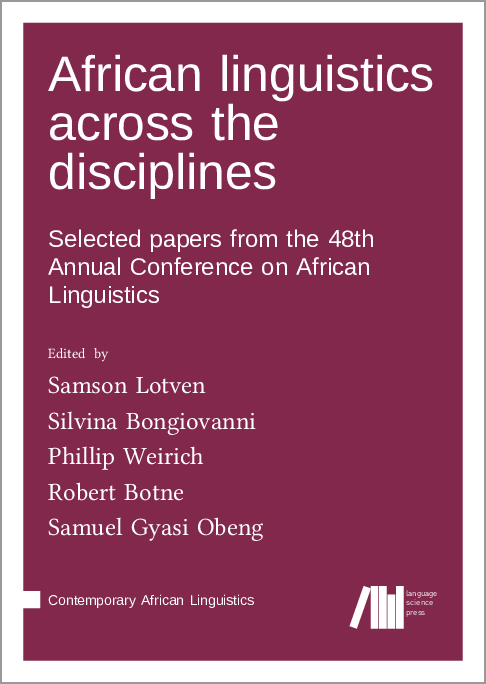We log anonymous usage statistics. Please read the privacy information for details.
African linguistics across the disciplines: Selected papers from the 48th Annual Conference on African Linguistics
Synopsis
Since the hiring of its first Africanist linguist Carleton Hodge in 1964, Indiana University’s Department of Linguistics has had a strong and continuing presence in the study of African languages and linguistics through the work of its faculty and of its graduates on the faculties of many other universities. Research on African linguistics at IU has covered some of the major language groups spoken on the African continent. Carleton Hodge’s work on Ancient Egyptian and Hausa, Paul Newman’s work on Hausa and Chadic languages, and Roxanna Ma Newman’s work on Hausa language structure and pedagogy have been some of the most important studies on Afro-Asiatic linguistics. With respect to Niger-Congo languages, the work of Charles Bird on Bambara and the Mande languages, Robert Botne’s work on Bantu structure (especially tense and aspect), Samuel Obeng and Colin Painter’s work on Ghanaian Languages (phonetics, phonology, and pragmatics), Robert Port’s studies on Swahili, and Erhard Voeltz's studies on Bantu linguistics are considered some of the most influential studies in the sub-field. On Nilo Saharan languages, the work of Tim Shopen on Songhay stands out. IU Linguistics has also forwarded theoretical work on African languages, such as John Goldsmith’s seminal research on tone in African languages. The African linguistics faculty at IU have either founded or edited important journals in African Studies, African languages, and African linguistics, including Africa Today, Studies in African Linguistics, and Journal of African Languages and Linguistics.
In 1972, the Indiana University Department of Linguistics hosted the Third Annual Conference of African Linguistics. Proceedings of that conference were published by Indiana University Publications (African Series, vol. 7). In 1986, IU hosted the Seventeenth Annual Conference of African Linguistics with Paul Newman and Robert Botne editing the proceedings in a volume entitled Current Approaches to African Linguistics, vol. 5. In 2016, Indiana University hosted the 48th Annual Conference on African Linguistics with the theme African Linguistics Across the Disciplines. Proceedings of that meeting are published in this volume.
The papers presented in this volume reflect the diversity of opportunities for language study in Africa. This collection of descriptive and theoretical work is the fruit of data gathering both in-country and abroad by researchers of languages spoken across the continent, from Sereer-sin in the west to Somali in the northeast to Ikalanga in the south. The range of topics in this volume is also broad, representative of the varied field work in country and abroad that inspires research in African linguistics. This collection of papers spans the disciplines of phonology (both segmental and suprasegmental), morphology (both morphophonological and morphosyntactic), syntax, semantics, and language policy. The data and analyses presented in this volume offer a cross-disciplinary view of linguistic topics from the many under-resourced languages of Africa.
Chapters
-
Syllable structure and loanword adaptation in Fròʔò
-
Variable word-final vowel deletion and reduction in GurmancemaA maximum entropy model
-
Toward a better knowledge of speech-language disorders in African countriesThe case of speech articulation disorders in Cameroon
-
Efik nominal tonal alternations as phrasal morphology
-
Number and animacy in the Teke noun class system
-
Tone, orthographies, and phonological depth in African languages
-
Prosodic restructuring in Somali nominals
-
DP-internal structure and agreement in Nafara
-
Complement clause C-agreement beyond subject phi-agreement in Ikalanga
-
Optional past tense in Wolof
-
The syntax of experiencers in Sereer-siin
-
Focus in Limbum
-
Universal quantification in the nominal domain in Kihehe
-
A closer look at biAn epistemic indefinite analysis
-
The semantics of -ø-…-íle in Nyamwezi
-
Logophoricity in Ibibio
-
Control of logophoric pronouns in Gengbe




